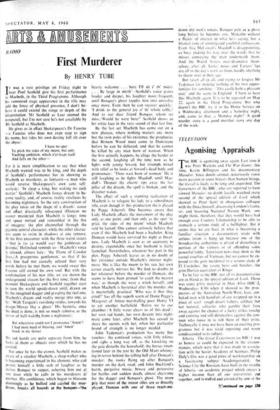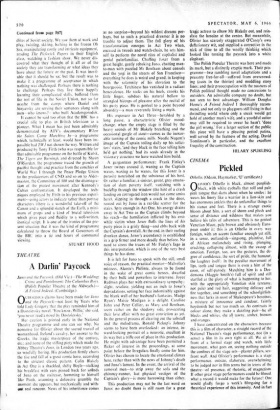TELEVISION
Agonising.'Appraisals
THE BBC is agonising away again. Last time it was Peter Watkins and The War Game; this time, Kevin Billington and his documentary Matador. Since dumb animals notoriously rouse more passion in some breasts than human beings, the travail is likely to be long and anguished. The Governors of the BBC'. who are reported to have viewed Matador, no doubt loyally watched every second of the special edition of Look which showed us Peter Scott in obsequious colloquy with the Duke himself, discussing London's fauna, sir, and boosting National Nature Week: one might think, therefore, that they would have had enough cosy Country Lifemanship to be able to stomach a serious study of a bullfighter. But it seems that we are back in what is becoming a familiar situation - a documentary made with serious intent is hung up because one of the broadcasting authorities is afraid of disturbing a portion of the viewers or of offending some powerful lobby. Television news may show us the casual cruelties of Vietnam. but we cannot be ex- posed to the gore incidental to a serious study of El Cordobes. the young hero and butcher, the grim Iberian equivalent of Ringo.
To be fair to the BBC not all its documentaries are as bland as the special edition of Look. There was some gritty material in Man Alive (BBC-2, Wednesdays 8.30) when it showed us the pros- pectors of the Australian North-West, lean, sun- baked men with handfuls of ore wrapped up in a piece of scarf rough desert fathers, celibate but not teetotal, solitaries who gamble their lives away against the chance of a lucky strike, touchy and cunning and still defenceless against the con- men who move in to rob them of their prize. Technically it may not have been an exciting pro- gramme but it was vivid reporting and never condescended to its subject.
Siberia - The Great Experiment on BBC-I was as honest as could be expected in the circum- stances, which were that it was made in associa- tion with the Soviet Academy of Sciences. Philip Daly's film was a good piece of workmanship on a fascinating subject—Academgorodok. the Science City the Russians have built in the middle of Siberia—an academic project which enjoys a higher income than all our universities put together. and is staffed and attended by one of the
Woadasted am page 31
Continued from page 567] dlites of Soviet society. We saw them at work and play, twisting, ski-ing, bathing in the frozen Ob Sea, manipulating costly and intricate equipment, reading The Pickwick Papers in their English class, watching a fashion show. We never dis- covered what they thought of it all or of the society they are transforming or what ideas they have about the future or the past. It was inevit- able that it should be so; but the result was to make it a programme of acceptance in which nothing was challenged. Perhaps there is nothing to challenge Perhaps they live there happily learning their complicated skills, buffered from the rest of life in the Soviet Union, not so far maybe from the camps where Daniel and Sinyaysky are serving their sentences along with men—who knows?— who built Academgorodok.
It cannot be said too often that the BBC has a crucial role to play in British television as a pioneer. What I mean has just been admirably demonstrated by ATV's documentary When the Saints Conte Marching In—a programme which, technically at least. would have been im- possible had TW3 not shown the way. Written and produced by Tony Firth (who was responsible for that admirable programme on the battle of Kursk, The Tigers are Burning). and directed by Shaun O'Riordan, the programme traced the growth of pacifist thought and practice from the conchies of World War I through the Peace Pledge Union to the predecessors of CND and so on to Alder- maston, the Committee of 100 and the disintegra- tion of the protest movement after Kennedy's Cuban confrontation. It developed the tech- niques employed by Firth in his previous experi- ment—using actors to indicate rather than portray characters (there is a wonderful take-off of the Canon and a splendid sketch of the Earl), a mini- mum of props and a kind of brutal television which gi% es pace and fluidity to a well-written, ironical script. It is one of the ironies of the pre- sent situation that it was the kind of programme calculated to throw the Board of Governors of the BBC into a tiz and hours of communal viewing.
STUART HOOD



































 Previous page
Previous page